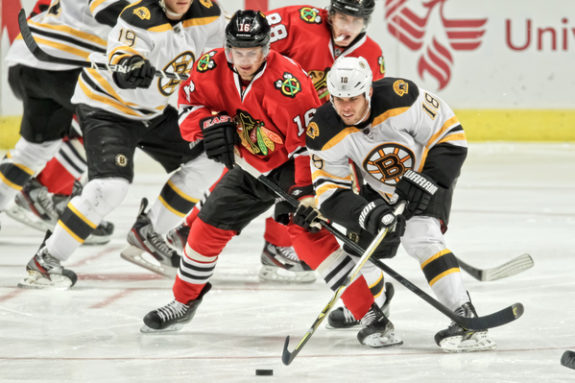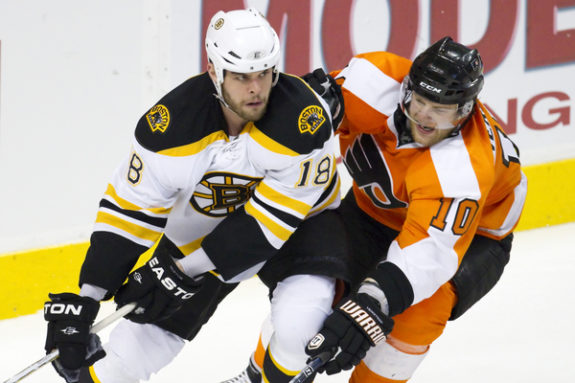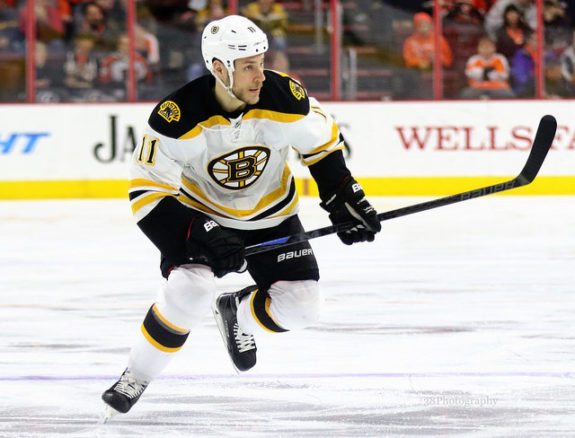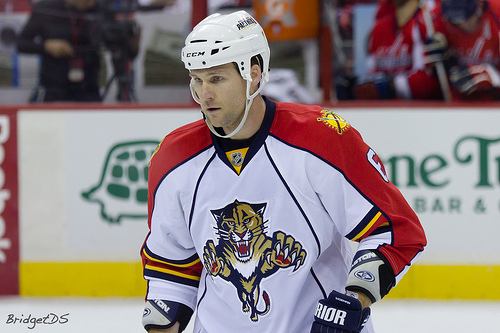On May 5, 2010, the Boston Bruins beat the Philadelphia Flyers 4-1 in Game 3 in the Eastern Conference Semifinals for a commanding 3-0 series lead. Needing to win just one of their next four games to advance to the Conference Final against the hated Montreal Canadiens, it seemed the Bruins and Habs were destined to battle for a berth in the Stanley Cup Final.
What seemed like an almost certainty turned into NHL history for the Bruins that they don’t want to be part of. They lost Game 4 in overtime 5-4, then proceeded to lose the final three games of the series, including Game 7 at home after holding a 3-0 lead to become just the third team in league history to blow a 3-0 series lead.
Related: The Evolution of Brad Marchand
After the dust settled from one of the biggest disappointments in the franchise history, general manager Peter Chiarelli decided to make a move to add to their roster. He looked to add more scoring to a team that struggled to score in 2009-10 and in the playoffs.
Chiarelli Trades for Horton and Campbell
Just over a month after their playoff disappointment against the Flyers, Chiarelli made a trade with the Florida Panthers on June 22 in Los Angeles right before the annual Entry Draft. He sent defenseman Dennis Wideman, the Bruins 2010 first-round draft pick and their 2011 third-round pick for Nathan Horton and Gregory Campbell.

Horton was the third overall pick of the Panthers in the 2003 Entry Draft. In six seasons with Florida, he scored 142 goals and had 153 assists in 422 regular-season games. He potted at least 20 goals for six straight seasons on a Panthers team that never made the playoffs and were in the middle of a rebuild.
At 6-foot-2 and 229 pounds at the time of the trade, the then 25-year-old right-winger had a questionable work ethic in South Florida, but his physical style and being able to score consistently was what the Bruins were looking for. Adding a goal scorer that has a tough-style to insert into the locker room and on the ice is what Chiarelli was able to do.
Related: Bruins and the 2006 NHL Draft – Gorton’s Trades Still Paying Off
Campbell was seen as a “throw-in” on the deal at the time. He did not light up the scoresheet in 2010 as he had just two goals and 15 assists. A fourth-line player, Campbell turned out to be more than a “throw-in” than originally thought.
Horton Settles in on the Top Line
Horton stepped right in with his new teammates and made an instant impact on the Bruins’ top line with David Krejci and Milan Lucic. He was second on the team in goals with 26, four behind Lucic. He tied for second with six power-play goals with Mark Recchi and two behind Michael Ryder and Zdeno Chara who each had eight.
You may also like:
- How the Bruins Stack Up in the Atlantic Division After Free Agency
- Bruins’ Marchand on Cusp of Historic 1,000-Point Milestone
- Bruins’ Opening Night Forward Projections
- 4 Bruins Storylines to Follow in 2024-25
- 9 NHL Teams That Missed in Free Agency
In the playoffs, Horton scored eight goals, but more importantly, it was when some of those goals were scored. In the Eastern Conference Quarterfinal against the Montreal Canadiens, Horton scored overtime goals in Game 5 and in Game 7 to survive against their heated rivals. In the Eastern Conference Final against the Tampa Bay Lightning, he scored the games only goal in the third period of Game 7 at the TD Garden in a 1-0 victory.

Horton failed to register a point in the Stanley Cup Final against the Vancouver Canucks and was lost for the series in Game 3 when he took a blindside hit from Aaron Rome during the Bruins’ 8-1 win that led to a concussion. He was taken off the ice on a stretcher and taken to a local hospital. Rome was suspended for the remainder of the series. Horton was able to accompany the team to Vancouver for Game 7 and was on the ice for the celebration after Boston’s 4-0 victory to end a 39-year championship drought.
Horton would play two more seasons in Boston, but again he was sidelined after taking a hit against the Flyers on Jan. 22, 2012. He would suffer his second concussion in six months and miss the remainder of the regular season and playoffs.
Related: The Ice Rink – A Brief History
He returned the following year after the lockout ended in January of 2013 and had 13 goals in 43 games. In the playoffs, he had seven goals and 12 assists as the Bruins lost in the Stanley Cup Final to the Chicago Blackhawks. Following the season, the Bruins chose not to resign Horton who left to sign with the Columbus Blue Jackets.
Campbell Added Depth at Center
Campbell added depth to the Bruins during the 2010-11 season and he centered the fourth line. A hard-nosed physical player, he tied a career-high with 13 goals in the regular season. In the playoffs, he had a goal with three assists in 25 games and had an assist in the Game 7 Cup-clinching win at Vancouver.

Campbell would play four more years in Boston and become one of the Bruins better and most important penalty killers. He would score 26 goals and have 36 assists over that time. In the 2013 playoffs, he had three goals and four assists in 15 games. At the end of his three-year contract that he signed with the Bruins in 2012, Campbell left for the Blue Jackets in 2015 and signed a two-year contract to go to Ohio.
Who Won the Trade?
Wideman only played 61 games during the 2010-11 season with the Panthers. He was productive offensively with nine goals and 24 assists in 61 games, but was part of a fire sale by Florida general manager Dale Tallon. He was dealt to the Washington Capitals at the trade deadline on Feb. 28, 2011.

Tallon traded the Bruins 2010 first-round pick to the Los Angeles Kings who used it to select Derek Forbort. In the following draft in 2011, the Panthers drafted left wing Kyle Rau with the other pick included in the Horton and Campbell deal. After four years at the University of Minnesota, Rau played just eight games in 2015-16 without registering a point. In 2016-17, he played in 24 games with two goals and an assist. Following the season, the Panthers let him leave in free agency and he signed with the Minnesota Wild.

In the aftermath of the stunning loss to the Flyers in the 2010 playoffs, Chiarelli looked to add scoring and more toughness to the Bruins the following year. It worked by trading for Horton and Campbell, who combined to score 39 regular-season goals and nine more in the playoffs.
The trade 10 years ago started a turnaround that went from one of the most disappointing endings to a season in 2010 to the best possible finish in 2011 with a championship. It was a deal that Chiarelli got out of it what he wanted for 2011 and beyond.
